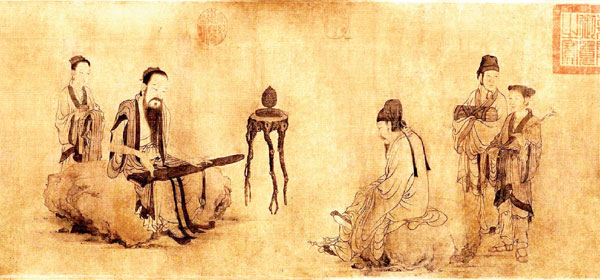A little knowledge can go a long way
Updated: 2014-06-27 07:34
By Huang Weijia and Liu Jue (China Daily Europe)
|
|||||||||||
|
The Chinese words for friends with a deep connection, zhiyin, literally "know the tune", is taken from the legendary friendship between musician Bo Ya and woodman Zhong Ziqi. Provided to China Daily |

Intellect is a broad concept in Chinese
At times, outspoken intellectuals may irritate some officials. While new ideas are often welcome, the way such ideas are expressed may get the authorities a bit hot under the collar. Yet, the original meaning for the word relating to "intellect" or "to know", 知 (zhī), implies outspokenness.
A compound of two pictographic characters is formed to suggest 知 - an arrow on the left and a mouth on the right, meaning "objects from the mouth that are faster than arrows". The riddle-like combination suggests a logic that is both intuitive and ancient: When one gains knowledge and understanding, one communicates it. 知识 (zhīshi), or "knowledge", is probably the most common noun consisting of the character. To further reflect on the importance of speech in people's understanding of the world, 识 also possesses the radical 讠, meaning talk. The radical on its right represents a piece of weapon, suggesting that such speech can be sharp.
There are many cases where 知 means knowledge. The absence of knowledge naturally means ignorance, or 无知 (wúzhī). The desire to peruse knowledge is 求知 (qiúzhī). Intellectuals are 知识分子 (zhīshi fènzǐ), or literally "members of knowledge". Intellectual property is 知识产权 (zhīshi chǎnquán), or "property rights over knowledge".
However, the original and most widely used meaning of 知 (zhī) is still "to know", as exemplified by the famous idiom from Sun Tzu's Art of War (《孙子兵法》Sūnzǐ Bīngfǎ): 知彼知己,百战不殆。 (Zhī bǐ zhī jǐ, bǎi zhàn bù dài. "Know yourself and know your enemy, and you will never be defeated.") On the battlefield, letting your enemy get inside your head can be dangerous, but in daily life, those who know you best are probably your closest friends, giving rise to the word 知己 (zhījǐ), which by itself means "bosom buddies". Along the same lines, 故知 (gùzhī, the old known) means "old friends". There are also true friends who share deep mental connections, or 知音(zhīyīn), which translates as "know the tune", a term taken from the legendary friendship between musician Bo Ya (伯牙) and woodsman Zhong Ziqi (钟子期) during the Spring and Autumn Period (770 BC - 476 BC). Despite their different social status, Zhong was the only one who truly understood Bo's music, so they became close friends. After Zhong's death, Bo smashed his zither and refused to play music again, because no one would ever be able truly to appreciate it.
In modern Chinese, 知 means 知道 (zhīdào, to know, to understand) in most cases, such as in 知晓 (zhīxiǎo, to know, to be aware), 知悉 (zhīxī, to know, to be informed of), and 知情 (zhīqíng, to know the fact of a case or details of an incident).
The core meaning of 知 remained unchanged over the years and is manifested in a series of words it helps to constitute: 知名 (zhīmíng) means well-known; consciousness is 知觉 (zhījué), literally "the known senses"; a notice is 须知 (xūzhī), literally "must know"; and 通知 (tōngzhī), is "to let people know".
Traditionally, 50 is an age at which people believe they are experienced enough to know their own destiny, therefore the term 知命 (zhīmìng, to know one's destiny) is used to represent the age 50.
According to philosopher Mencius, who always seemed to think the best of mankind, conscience is what everyone intuitively knows at heart about right and wrong, or良知 (liángzhī, "good knowledge").
But, those who are skeptical and regard people as complicated and difficult to understand might quote the old folk saying: 画虎画皮难画骨, 知人知面不知心。(Huà hǔ huà pí nán huà gǔ, zhī rén zhī miàn bù zhī xīn. "Painting a tiger's skin is easy, but not so with the bones. You may know a person's face but not their heart.")
In learning, one must always be aware of half-baked truths, giving rise to the saying: 一知半解不如一无所知。(Yì zhī bàn jiě bùrú yì wú suǒ zhī. "Having incomplete knowledge is worse than knowing nothing at all.")
However, when you are well informed on a subject, or even an intellectual yourself, it's best to 知无不言,言无不尽 (zhī wú bù yán, yán wú bú jìn, "say all that you know and tell it without reserve").
As for centuries, the principle of 言之者无罪,闻之者足以戒 (yán zhī zhěwú zuì, wén zhī zhě zú yǐ jiè, "blame not the speaker, but be warned by his words") has been used to remind authorities and individuals of the value of opinions.
Courtesy of the World of Chinese, www.theworldofchinese.com
The World of Chinese
(China Daily European Weekly 06/27/2014 page27)
Today's Top News
Prime London properties lure investors
FIFA bans Suarez for 4 months
Tycoon criticized for charity in NY
50 trapped Chinese back to Baghdad
Northern Iraqis flee their home, avoiding Sunni millitans
DPRK test-fires newly developed missiles
RIMPAC drill not window-dressing for China-US ties
Li puts China-UK ties on new level
Hot Topics
Lunar probe , China growth forecasts, Emission rules get tougher, China seen through 'colored lens', International board,
Editor's Picks

|

|

|

|

|

|






